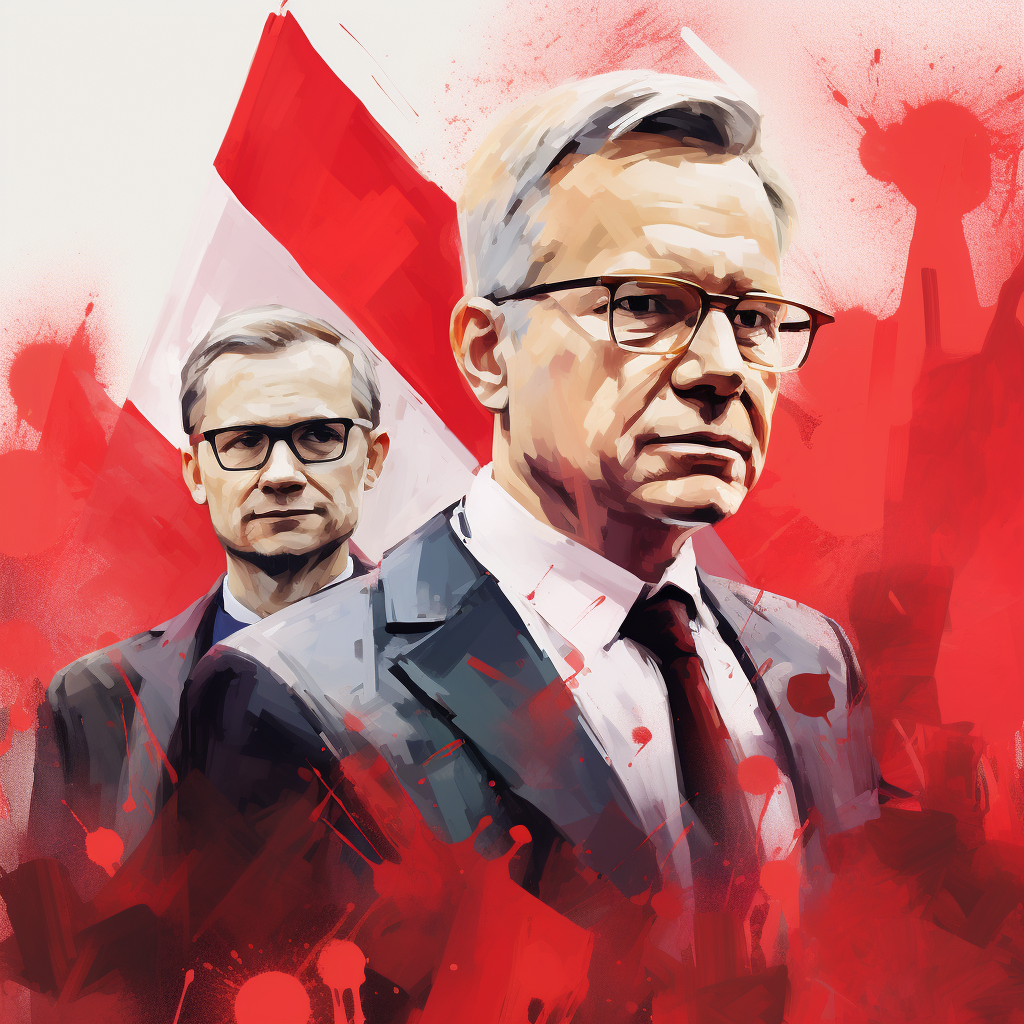In the heart of Poland, a battle unfolds between happiness and sorrow, shaping the soul of the nation. The 2023 election will redefine what it means to be truly Polish.
In the intricate maze of cobblestoned streets that form Warsaw’s beating heart, a thrum of electric anticipation could be felt. Everywhere you went, in cafes, shops, and bustling squares, hushed whispers and fervent shouts coloured the air, each carrying kernels of discussion, predictions, hopes and fears for the imminent general elections of 2023. Phone screens across the city danced with the blue light of the latest polling updates, sparking debates and discussions with every flicker. Eager volunteers, their faces glowing with the conviction of their chosen cause, held out handfuls of leaflets, fervently trying to sway the few who remained adrift in the sea of political decision-making.
Inside the busy campaign headquarters of the Progressive Liberals, charismatic leader Maria Nowak held an urgent meeting. “Operation Happiness isn’t just about plastering smiles on faces,” she passionately explained to her team, her eyes reflecting the optimism that was propelling their campaign forward. “It’s about changing the very narrative of our national identity. We need to sweep away this persistent image of the melancholic Pole and paint a new picture – one of resilience, vibrancy, and positivity.”

Their proposed means of achieving this was as bold as it was ambitious. The school curriculums were to be overhauled to focus on Polish history’s triumphs and tales of indomitable spirit, shifting away from the well-trodden narrative of oppression and suffering. “Our children must learn of our strengths, our victories,” Maria said, her voice resounding through the room, “That is the bedrock of our future’s happiness.”
At the heart of their strategy was DigiPoland, a cutting-edge digital media agency tasked with spreading happiness across the online landscape. They were to make every post, every tweet, every byte of data pulsate with positivity, injecting a digital dose of joy into the digital veins of the country. It was an unprecedented, high-tech approach, befitting of the progressive nature of Nowak’s campaign.
However, not too far away, in the soberly decorated conference room of the Conservative Party’s headquarters, a starkly contrasting scene was unfolding. Seasoned politician Adam Kowalski stood firm, his gaze steely as he addressed his party. “We are not a people defined by our smiles, but by our spirit,” he argued, his voice echoing the deep-rooted belief in the authenticity of the stoic and melancholic Pole. “Our suffering, our trials, they are part of our national tapestry. They make us who we are. Happiness-isation? It’s a betrayal of our identity.”

Kowalski’s manifesto held up the visage of a stoic, somber Pole as the true symbol of the nation’s spirit, as an authentic testament to a history marked by trials and tribulations. He urged his compatriots to embrace their melancholy, to wear it openly like a badge of honor, a poignant echo of the hardships their ancestors had weathered. “Let’s not replace our rich tapestry with a shallow veneer of cheer. Let’s remain true to who we are,” he proclaimed, his words resonating with his listeners, amplifying their determination.
The passionate ripples of the debate touched every corner of Polish society, igniting heated discussions in every possible locale. In the cosy warmth of the local pubs, over frosty glasses of beer and plates of pierogi, voices rose and fell, interweaving their political arguments with tales of the everyday. The city parks echoed with fervent debates, their usually tranquil spaces now serving as arenas for thoughtful deliberation. The social media landscape was ablaze with opinions and counter-opinions, hashtags, memes, and video clips that were shared, liked, and retweeted with frantic energy.
Traditional media outlets, meanwhile, were saturated with deep dives into the issue at hand. Thought-provoking op-eds, comprehensive historical analyses, sociological perspectives, they all grappled with the task of shedding light on this unique electoral battleground. Even international media outlets took notice, with articles being penned in faraway newsrooms from New York to New Delhi.

Interestingly, it was amidst this passionate furore that an unexpected, somewhat paradoxical, phenomenon emerged. As Poles engaged in fierce debates and discussions about their national identity, they began to deeply introspect. Who were they as a people? What did it truly mean to be Polish? These questions, once left to philosophers and academics, were now part of everyday discourse.
And this introspection triggered a cultural renaissance of sorts. Painters, writers, musicians, all started to explore this question through their art. Galleries displayed portraits of diverse Polish faces, bookstores filled up with books exploring Polish identity, and musicians composed songs that reverberated with the nuanced exploration of the Polish soul. Through the heated campaign period, the nation found a strange sense of unity in this shared exploration.
As the election day drew tantalisingly close, the nation was on tenterhooks. Pollsters, despite their sophisticated models and algorithms, declared the race too close to call. The battle lines were clear. On one side stood Maria Nowak, her bright banners of optimism and future-facing policies gathering a wave of support. On the other side, the steadfast Adam Kowalski held the fort, his followers clinging to the raw authenticity he championed. The countdown was on, and Poland was ready for a decision that would echo through the ages.
In a corner cubicle at DigiPoland’s bustling Warsaw office, a young operative named Lukasz Szymanski found himself at the forefront of a digital revolution. A coding prodigy and a psychology enthusiast, Lukasz had spent countless hours analysing data from social media interactions. One day, he stumbled upon an intriguing pattern: certain combinations of emoticons and text seemed to trigger an overwhelmingly positive response, even in the most cynical online trolls.
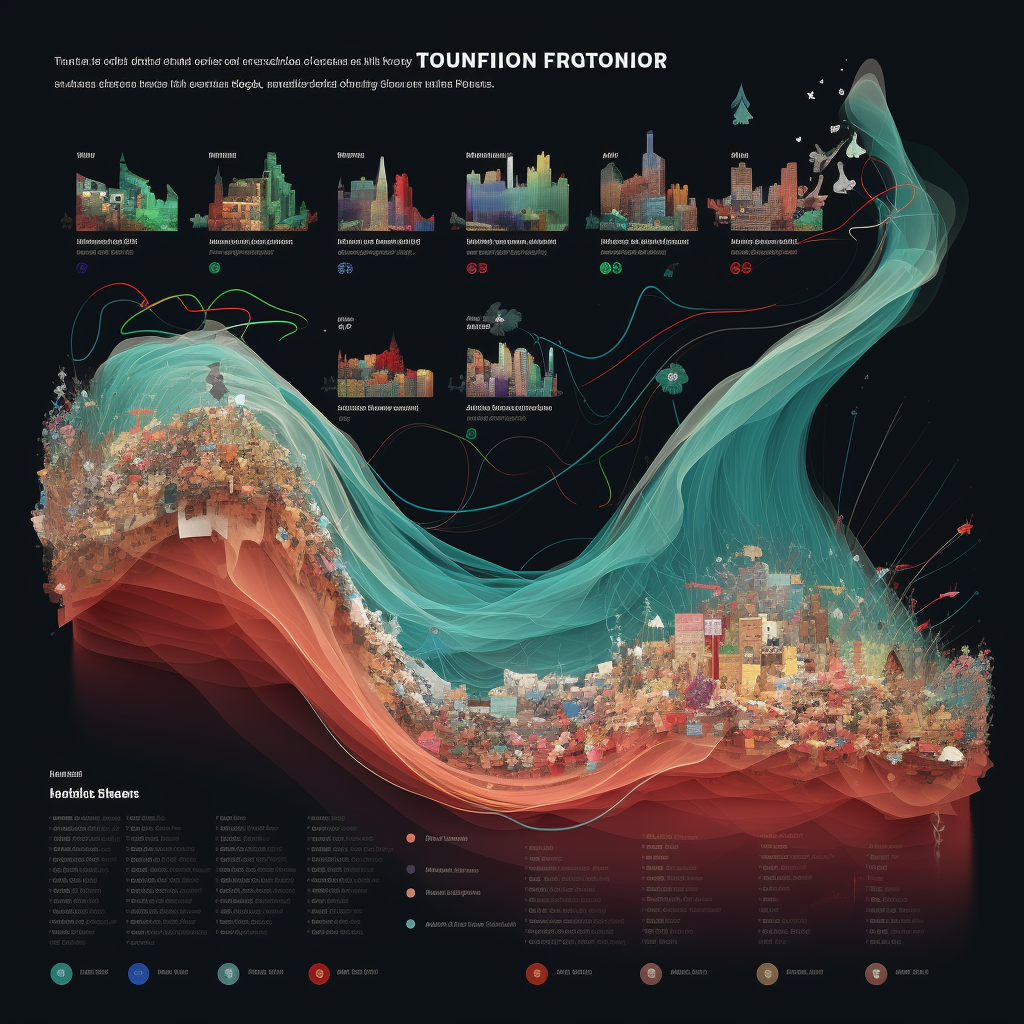
The formula was simple yet powerful. Posts with a perfect mix of words that invoked resilience, triumph, and positivity, complemented with a sequence of happy and heartening emoticons, seemed to neutralise the harsh sting of online hate. Lukasz presented his findings to the team, and before long, DigiPoland’s content began to incorporate his formula. Almost like magic, the toxic venom that once dominated comment sections and threads began to dissipate. Positive voices, once lost amidst the harsh discord, now started to find their strength and filled the digital landscape.
The change was noticeable. The general sentiment of online conversations became more positive. Videos of Poles sharing uplifting stories started trending, posts about community successes got thousands of likes, and tweets encouraging resilience and hope were retweeted into virality. The wave of positivity was sweeping across the digital landscape of Poland, influencing the mood of the nation.
However, the abrupt change in online sentiment didn’t go unnoticed by the Conservatives. They watched as their posts, filled with reminders of past suffering and stoic resilience, drowned amidst the flood of positive content. Accusations began to fly. “Algorithmic manipulation,” they cried, pointing fingers at the Progressives. “Social media platforms are complicit in rigging the election,” others claimed, their voices filled with frustration and worry. “There’s a happiness bias in the digital world,” became the rallying cry.
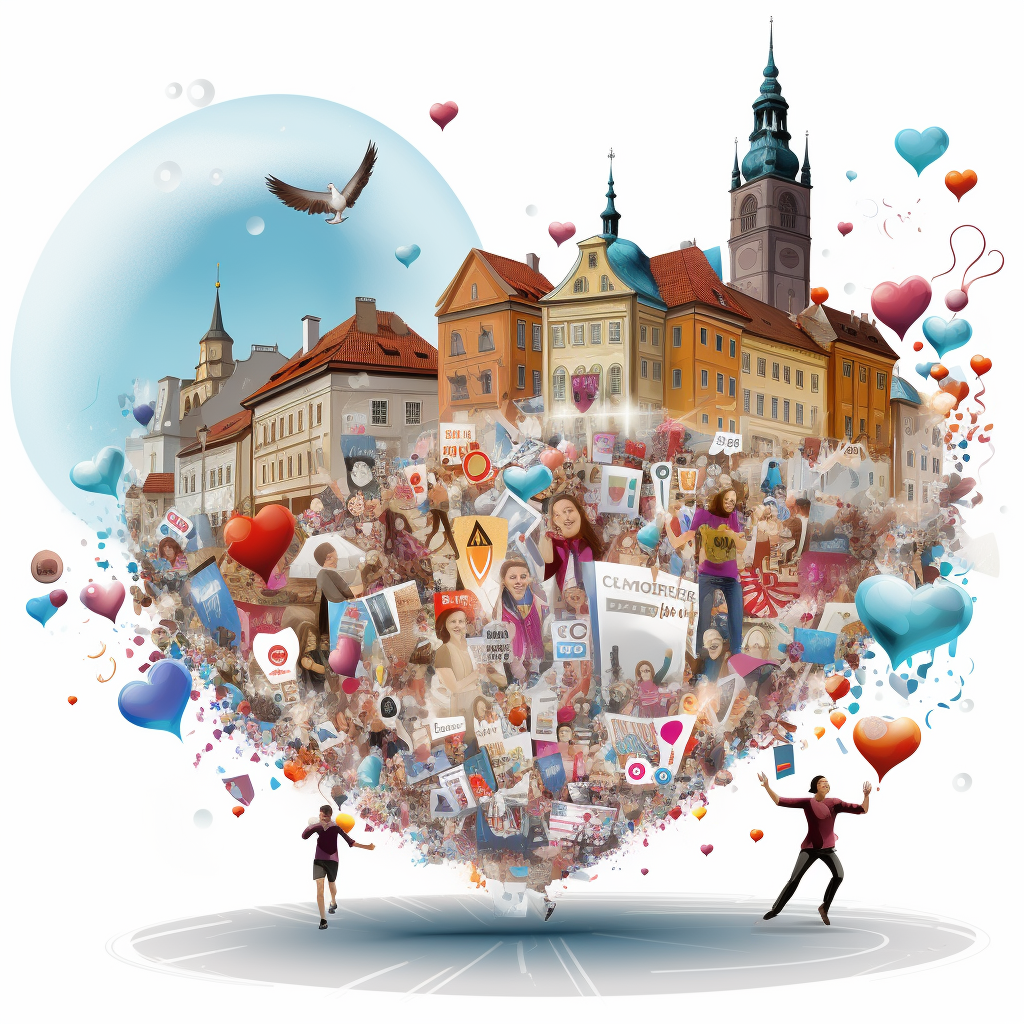
The Conservatives demanded balance. They argued that the internet, a space that should encourage all forms of expression, was now suppressing the voices that spoke of sorrow, hardship, and melancholy. The party called for an immediate rebalance in the digital space, urging platforms to ensure a fair representation of both joyous and sombre content. They didn’t want to halt the wave of happiness but sought to remind everyone that beneath the smiles, there was a wealth of lived history that had its roots in sorrow and struggle. The election campaign had taken an unexpected turn, and Poland waited with bated breath to see what came next.
In response to the rising tide of online positivity, the Conservatives took to the streets, their determination as firm as the cobblestones under their feet. Organising marches that travelled through the heart of Warsaw, and into the corners of other towns and cities, they rallied their supporters in a visible show of somber solidarity.
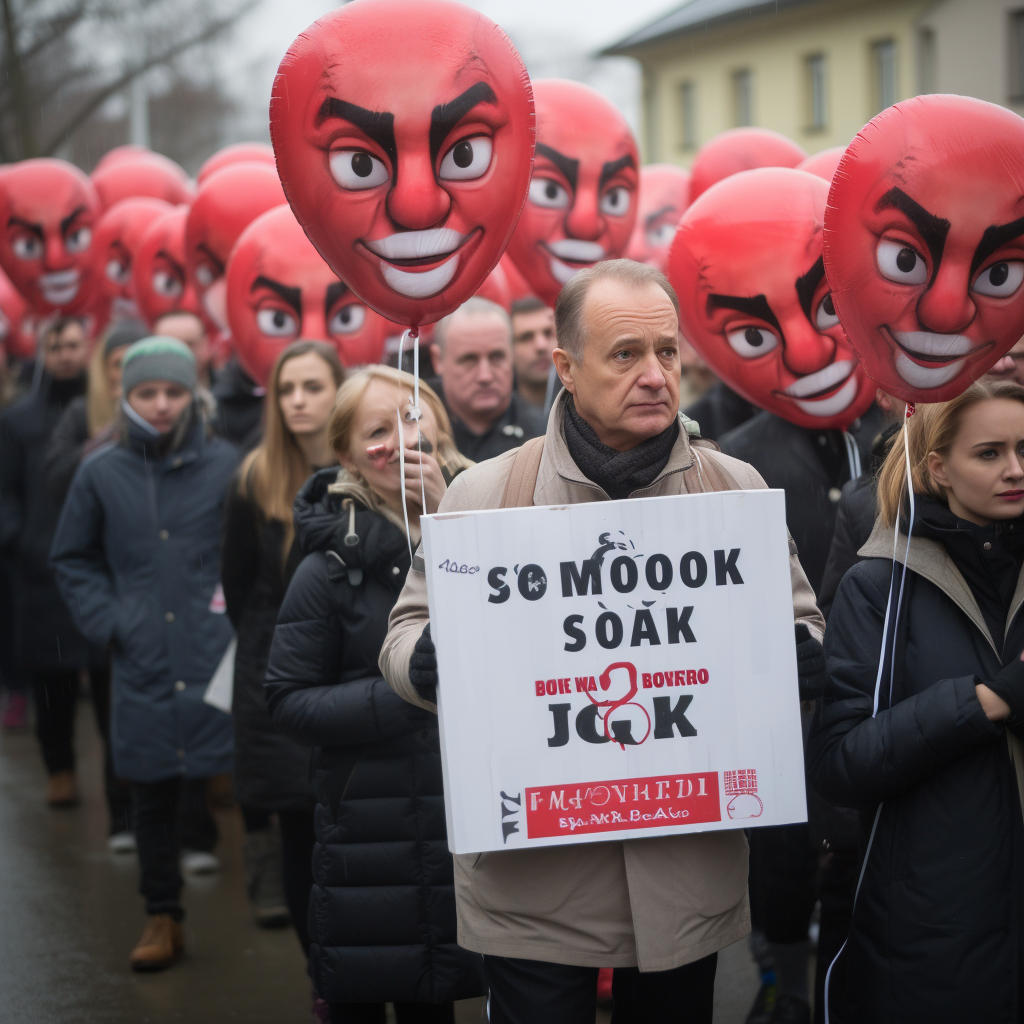
Participants in these marches were urged to keep their faces deliberately devoid of joy, to wear expressions reflecting a centuries-old narrative of resilience born from sorrow. Banners lofted above the sea of somber faces bore messages that voiced their resistance. “There is nothing to be happy about,” read one, while another boldly stated, “Sad is good.” Perhaps the most poignant of them all, “Happy is not Polish,” underlined their stand against what they saw as an imposition of forced cheerfulness.
The marches took on a rhythm of their own, the procession of solemn faces weaving through city streets, tracing routes that had borne witness to countless historical moments. Their silent, sorrowful demonstration painted a stark contrast against the background of a digital landscape bursting with optimistic narratives.
However, by the time these marches had picked up momentum, the wave of happiness had already swelled to great proportions. Despite the Conservatives’ fervent efforts, the populace was increasingly drawn towards the Progressive’s narrative of optimism and hope. It was as if the nation, once held in the tight grip of melancholy, was slowly stretching out, basking in the newfound warmth of positivity. And so, it seemed that the Conservatives were facing an uphill battle against a tide they could not turn.

In a hastily convened meeting at Conservative campaign headquarters, an atmosphere of urgency hung heavy in the air. Adam Kowalski, the party’s leader, was calling for new strategies to counteract the unstoppable happiness wave. “We need to make the people see that there is authenticity, value, even beauty in our shared sorrow,” he insisted, his eyes scanning the room for a response.
The campaign team, a collection of seasoned politicians, PR experts and grassroots organisers, exchanged glances. Finally, one of them spoke up. “But Adam,” said Joanna, a veteran strategist, her brows furrowing as she glanced at her notes, “there’s a paradox here. We’ve done our job too well. There’s little to be sad about.”
A murmur of agreement rippled across the room. It was a point of undeniable truth. Under the Conservative government, the country had seen remarkable stability. Unemployment figures were at an all-time low, healthcare reforms were functioning effectively, and there was a general sense of wellbeing among the populace. “We’ve ensured people’s lives are in order, we’ve done our job too well,” added Tomasz, a policy advisor, his voice tinged with a mix of pride and frustration.

Adam paused, looking around the room at the faces of his team. There was truth in their words, and a peculiar irony. In their pursuit of maintaining Poland’s inherent stoicism and respect for their difficult past, the Conservatives had worked hard to ensure a stable, prosperous present. This, however, had given the people little reason to look upon their lives with anything but satisfaction and, indeed, happiness. The room fell silent as they pondered this paradox, their challenge now not just to counter the Progressive’s narrative, but their own success as well.
As dawn broke on the election day, Poland found itself awash in a sea of anticipation. The streets buzzed with nervous energy, the polling stations teeming with Poles eager to make their voices heard. And as the day wore on into night, a verdict emerged that was as surprising as it was symbolic.
The Progressive Liberals had won. Maria Nowak, with her infectious optimism and ‘Operation Happiness,’ was set to steer the Polish nation towards a future built on joy, resilience, and positivity. The people had spoken and their message was clear: They chose happiness.
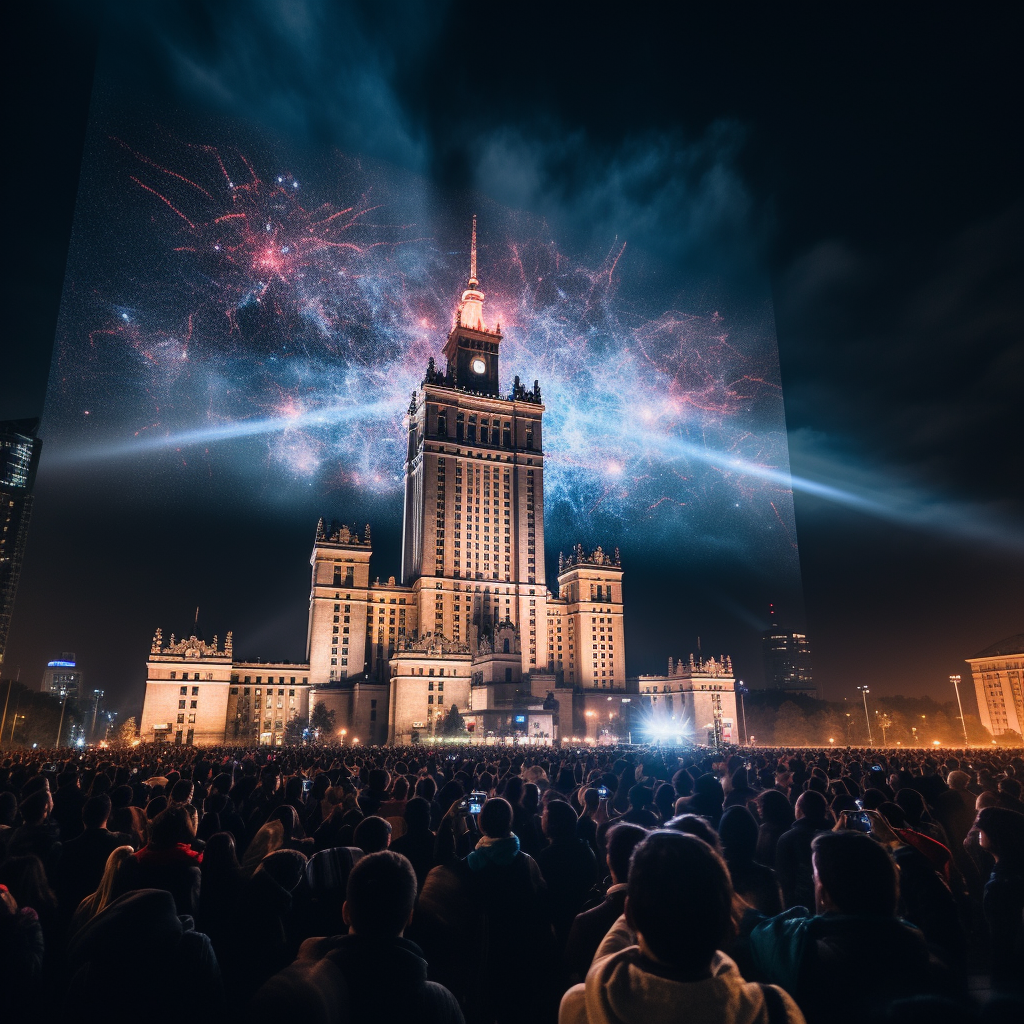
But as the news spread, an understanding also dawned. This wasn’t just a victory for the Progressives, it was a confirmation of the Conservatives’ success too. For it was under their watchful governance that Poland had progressed to a point of stability and wellbeing, where the pursuit of happiness could be a national agenda.
In their endeavour to maintain the nation’s authentic stoicism and respect for the past, the Conservatives had inadvertently cultivated a present that was ripe for optimism. Their robust policies had ushered in low unemployment, effective healthcare, and a general sense of contentment among the populace.
In an unusual twist of fate, the Conservatives had made Poland ready for happiness, paving the way for a Progressive future. As the nation celebrated this new chapter, one could argue that the essence of the Polish soul had remained intact. The stoicism had not disappeared; it had simply evolved. The resilience and spirit of the past had built a present that was strong enough to aspire for happiness, a true testament to the success of the Conservative’s governance.
And so, in a nation that had known countless hardships and endured, the story of the 2023 general election became another layer in its rich, ever-evolving history. Amid the echoes of triumphant cheers and somber reflections, one thing remained certain: Poland was ready to step into the future, smiling.
Now, the victorious Progressives faced an ironic challenge: managing the happiness they championed, they may need to eventually make the Poles sad again.

All images generated using Midjourney
